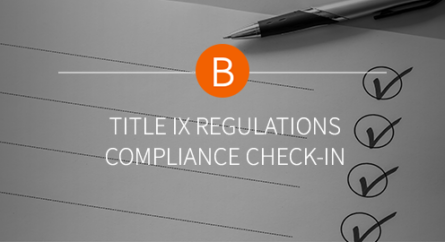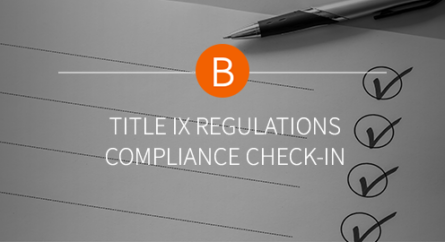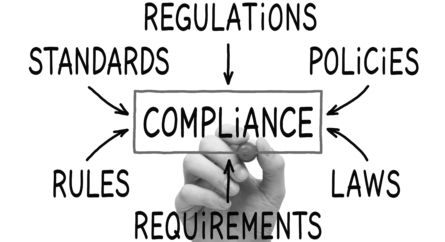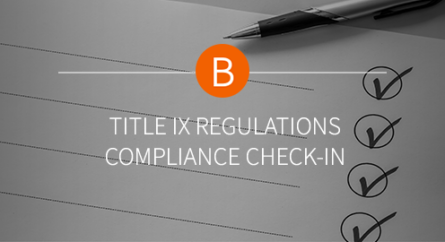3-Part Series: Fall Semester Is Underway, Is Your College Up to Date on the Latest Federal Civil Rights Guidance? Part 3
In this three-part series, we’ll review the latest federal civil rights guidance, including Title VI, ADA and Section 504, and Title IX.
Part 3: Not Enjoined? Here’s the Latest Title IX Guidance on Pregnancy Discrimination (Title IX)
On September 12, 2024, OCR released its latest guidance on the Title IX regulations that went into effect on August 1, 2024, for those states and colleges who are subject to the Department of Education (DOE)’s 2024 Title IX regulations.
As a reminder, federal courts have enjoined the Title IX regulations from enforcement for certain colleges – including those in Alabama, Alaska, Arkansas, Florida, Georgia, Idaho, Indiana, Iowa, Kansas, Kentucky, Louisiana, Mississippi, Missouri, Montana, Nebraska, North Dakota, Ohio, Oklahoma, South Carolina, South Dakota, Tennessee, Texas, Utah, Virginia, West Virginia, and Wyoming, and certain schools and colleges subject to the decision in Kansas. Those colleges are still subject to the 2020 Title IX regulations, which in most cases means adhering to sexual harassment policies and procedures that have been in effect for the past several years. Remember, however, that the 2020 Title IX regulations include non-discrimination protections for students experiencing pregnancy and related conditions.
Colleges and universities who are not enjoined are facing not only changes to policy, but also to the role of the Title IX Coordinator and scope of conduct that they are addressing under Title IX. OCR’s guidance may be helpful in tackling or keeping track of some of these new responsibilities. First, OCR has provided an outline of the Title IX Coordinator’s duties, which all Title IX Coordinators should be well aware of by now. If you haven’t already, check out Bowditch’s Title IX Regulations Compliance Check-In in May on Title IX Coordinator duties under the 2024 regulations.
Second, OCR sheds light on the 2024 Title IX regulations’ requirements to address discrimination based on pregnancy and related conditions by providing a detailed, 17-page FAQ that addresses pregnancy discrimination as well as discrimination based on parental, family, or marital status. This guidance document largely summarizes the Preamble to the 2024 Title IX regulations in a bite-size form. It does not provide examples, other than those already discussed in the Preamble.This guidance document is a good read if you didn’t have time to read the lengthy Preamble to the 2024 Title IX regulations and you didn’t attend Bowditch’s Title IX Compliance Check-In in July on Pregnancy and Related Conditions.
Key questions we’ve received from clients relate to what is covered under “pregnancy and related conditions” and what are some typical reasonable modifications. Here, the latest guidance shines:
- OCR provided examples of medical conditions related to pregnancy that are covered under the law, such as “pregnancy-related fatigue; dehydration (or the need for increased water intake); nausea (or morning sickness); increased body temperature; anemia; and bladder dysfunction; gestational diabetes; preeclampsia; hyperemesis gravidarum (severe nausea and vomiting); pregnancy induced hypertension (high blood pressure); infertility; recovery from childbirth, miscarriage, or abortion; ectopic pregnancy; prenatal or postpartum depression; and lactation conditions, such as swelling or leaking of breast tissue or mastitis” and including “abortion, miscarriage, or stillbirth.”
- OCR provided examples of reasonable modifications for students experiencing pregnancy or related conditions, including “[a]dditional, longer, or more flexible breaks during class to express breast milk, breastfeed, or attend to health needs associated with pregnancy or related conditions, including eating, drinking, or using the restroom; [i]ntermittent absences to attend medical appointments; [a]ccess to online, remote, or homebound education; [c]hanges in schedule or course sequence; [e]xtensions of time for coursework and rescheduling of tests and examinations; [a]llowing a student to sit or stand, or carry or keep water nearby; [c]ounseling; [c]hanges in physical space or supplies (for example, access to a larger desk or a footrest); [e]levator access; or [o]ther changes to policies, practices, or procedures.”
If you are continuing to improve your Title IX pregnancy and related conditions policies and procedures or have any questions, please contact your Bowditch attorney.
Categorized: Civil Rights, Pregnancy
Tagged In: pregnancy discrimination, Title IX Coordinator’s duties, Title IX guidance, Title IX regulations













